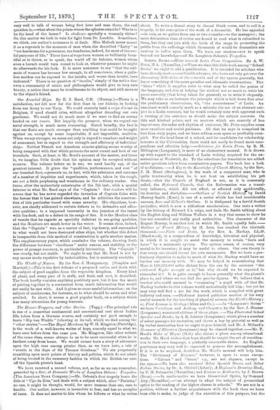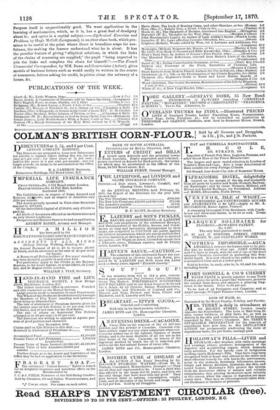SCHOOL Booss.—Hints towards Latin Prose Composition. By A. W: Potts,
M.A. (Macmillan.)—When we class this little work among "School. Books" we ought to add a qualification. It is intended for scholars who. have already made a considerable advance, who have not only got over the elementary difficulties of the concords and of the syntax generally, but know something of the more peculiar and idiomatic constructions. The "hints" which it supplies refer to what may be called the genius of the language, and aim at helping tho student not so much to write his prose correctly (that being taken for granted), as to write it elegantly. We may take as an instance the principle which is laid down first after- the preliminary observations, viz, "the concreteness" of Latin. An
examiner would scarcely mark as a mistake the use of an abstract sub- ject in a Latin sentence, but ho would certainly note with approval such a turning of the sentence as should make the subject concrete. On this and kindred points, and on matters which are scarcely of less. importsnce, the order and rhythm of sentences, Mr. Potts supplies some most excellent and useful guidance. All that he says is comprised in less than sixty pages, and wo have seldom seen space so profitably occu- pied. For the head form of a school, and for candidates for scholarship honours at the Universities, there could not easily be found more com-
pendious and effective holp.—Seledions for Latin Prose, by R. M. Millington (Longmans), is more of an elementary manual. It is drawn.
up with regard to the standard of Latin writing required for the ex-
aminations at Woolwich, &c. To the selections for translation aro added. entire questions taken from examination-papers. The book has a look of usefulness.—A. Key to the Knowledge of Church History, by the Rev.
J. H. Blunt (Rivingtons), is the work of a competent man, who is- quite trustworthy when ho is not bent on establishing his pet thesis,—that the Church of England is not, as it is commonly called, the fffortned Church, that the Reformation was a transi- tory influence, which did not affect, or affected only accidentally,. its doctrine and discipline.—Outlines of Scottish Historf by David, Murray Smith (Kent), is one of a series which has had considerable success, Ince and Gilbert's Outlines. It is disfigured by a fervid Scotch. prejudice, which is now a ridiculous anachronism. One tests a writer by the history of Edward I.'s reign, and finds Mr. Smith talking about the English king and William Wallace in a way that seems to show he' has not consulted any really good authorities. Tho character of the- Regent Murray, is another test in which Mr. Smith equally Outlines of French History, by H. Ince, has reached the thirtieth thousand.— Facts and Dates, by the Rov. A. Mackay, LL.D.
(Blackwood), is a compendium of knowledge, historical and physical,.
in which it is sought to assist the memory to retain "facts and• dates" by a mnemonic system. The system seems, of course, very
useful to its inventor; it may be useful to others. Our own theory is• that every one should invent his own mnemonics. But we have a pre- liminary objection to make to much of what Dr. Mackay would have us
burden our memory with. Wo may be helped in remembering that Mars is 140,322,000 miles distant from the sun by the sentence "the' celebrated Kepler wrought at it," but why should we be expected to. remember it ? It is quite enough to know generally what the planet's place is, and where we can find the precise figures. Wo believe that a teacher who could succeed in " cramming " a pupil with all that Dr. Mackay includes in this volume would undoubtedly kill him ; but yet ho- may very well find a use for the work, which is compiled with great industry and care.—Professor Anstod publishes another of his very useful manuals for the teaching of physical science, the Earth's History ; or, First Lessons in Geology (Allen and Co.).—In "Longman's Series ''' we have Coriolanus and Anthony and Cleopatra, by the Rev. J. Hunter (Longmans), annotated editions of these plays.'—The Illustrated School' Speaker and Reader, by A. K. Isbister (Longmans), which gives a number of select passages for recitation, and shows a boy by pictorial as well as- by verbal instruction how he ought to pose himself, and Mr. J. Millard's. Grammar of Elocution (Longmans) may be classed together.—Mr. T.. Hood's Rules of Rhyme (Holt) also claims a place among educational, works. Mr. Hood wishes that boys should bo taught the art of versifica- tion in their own language, a perfectly reasonable desire. An English; gentleman may very well bo expected to possess the accomplishment. If it is to be acquired, doubtless Mr. Hood's manual will help him.. The "Dictionary of Rhymes," however, is open to some excep- tions. "Cuirass " and " brass," e.g., are not rhymes, except to the eye.—We have also received Select Spanish Stories and Select Italian Stories, by Dr. A. Olivieri (Asher); A Beginner's Drawing-Book,. by P. H. Delamotto (Macmillan) and Lessons in Arithmetic, by J. Brown, (Dean).--In mathematics we have Geometrical Optics, by Osmand Airy (Macmillan),—" an attempt to adapt the subject of geometrical optics to the reading of the higher classes in schools." We are not in a
position, without a further acquaintance with the book than we have been able to make, to judge of the execution of this purpose, but the
Purpose itself is unquestionably good. We want applications in the learning of mathematics, which, as it is, has a great deal of drudgery about it ; and optics is a capital subject.—Algebraical Exercises and Problems, by Hugh McColl (Longmans), is another class-book, which pro- mises to be useful at the point where there is boundless scope for use- fulness, the making the learner understand what he is about. It has the peculiar feature of giving "elliptical solutions, in which the links of the chains of reasoning are supplied," the pupil "being expected to join the links and complete the chain for himself."—The French Commercial Correspondent, by MM. Dann and Conxvoisier (Asher), gives models of business letters such as would really be written in the course of commerce, letters asking for credit, inquiries about the solvency of a house, en.































 Previous page
Previous page